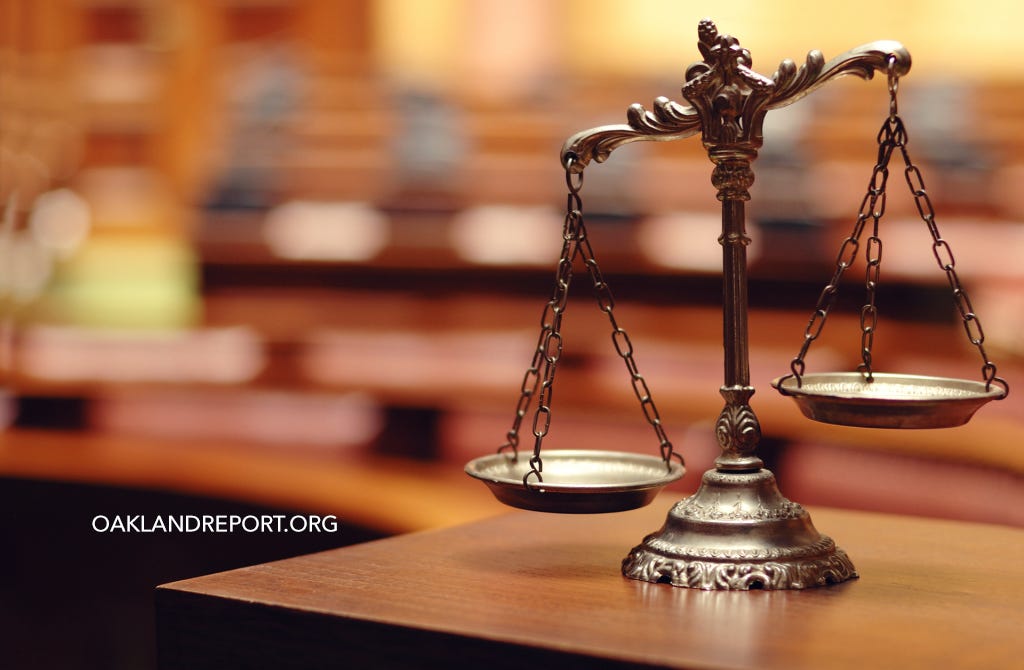Oakland could pay $674 million in damages in disastrous coal terminal lawsuit
The City of Oakland loses its fourth appeal in massive lawsuit over its shipping terminal development. Now the city faces hundreds of millions in damages. If awarded, Oaklanders will foot the bill.
The City of Oakland fought the law, and unfortunately for Oaklanders, the law won. Again. This week a bankrupted shipping and logistics company won a court decision1 against the city in a federal court. If the ruling sticks, Oakland taxpayers and residents could pay $674 million in damages2 that otherwise would be spent on city services.
To put that into context, the city’s total expenditures in 2024 were $1.66 billion against $1.53 billion of revenues (with the difference paid from bond issues)3. And cumulative projected deficits for the past 5 years were about $500 million, including the COVID pandemic years. This one lawsuit represents a financial shock larger than any the city has faced, while it is still struggling to close its existing structural deficit.
This ruling is the result of repeated missteps by the city’s past and present leadership who prioritized political expediency over the city’s financial, economic, and legal obligations.
Subscribe for free to Oakland Report to receive our articles in your inbox, and consider donating to support our work. We are a volunteer-run, nonprofit organization, and your donation is tax-deductible.
The city reneged on its contract
As we reported last week, the city of Oakland attracts (and pays out) an exceptionally high number of major lawsuits. And now it faces what may be the biggest lawsuit in its history.
Oaklanders may remember all those yard signs and rallies that popped up a couple years ago with the slogan, “Keep Coal Out of Oakland.” They were a wave of advocacy in a years-long campaign against the proposed terminal at the former Oakland Army Base in an area known as the West Gateway Terminal. The advocacy started after word spread that coal could be transported through the new shipping terminal.
That public pressure, and city leaders’ capitulation to it, has put the city into multiple painful political and legal binds of its own making. The agreement between the city and the developer for the West Gateway Terminal project had already been approved by the city council and signed by the city, forming a legally binding contract with the developers.
The deal was to have big financial returns for the city, which was and still is in dire need of new investment and tax revenue through economic development. The developer and its partners had already begun the work of assembling financing for the project and taken on tens of millions in financial obligations in order to do the work they were legally obliged to undertake through their contract with the city.
Aligning themselves to the vociferous “No Coal” campaign, the city leadership under the administration of former mayor Libby Schaaf reneged on the deal. The city council and staff moved aggressively on several fronts to block coal at the Terminal, including but not limited to terminating the lease. Monday’s ruling describes the matter succinctly thus:
Specifically, the undisputed facts confirm that Oakland Mayor Libby Schaaf, along with City Councilmember Dan Kalb and others, stated that they would do everything in their power to stop the Terminal project, inherently interfering with Plaintiff’s rights under the Sublease. As a result, Barbara Parker and employees in the City Attorney’s office would not acknowledge the validity of the Sublease, electing instead to attempt to terminate the Ground Lease. Additionally, the City Attorney’s office provided a false statement in the estoppel certificate4 and would not execute the required non-disturbance agreement5. This conduct by Defendant’s employees was all in furtherance of their improper desire to stop and interfere with the Terminal project.
The developer filed suit, and the city countered. Since then, the parties have been embroiled in extensive and expensive litigation, including three appeals. The city lost all three of those appeals. Now this week comes another devastating legal judgement against the city.
In the ruling on Monday, the judge noted the plaintiff’s valuation of the Terminal development (and thus the potential amount of damages) at $673,658,000, and further noted that the city’s own valuation expert did not dispute the math or methodology of that calculation. Instead, the city’s valuation expert adjusted the plaintiff’s valuation model down to the “levels of risk acceptable” to the city using various technical means, and came up with calculated damages between $230 million and $354 million.
A perilous situation and a recalcitrant city leadership
Regardless of one’s position on coal and coal transport, Oakland is now in a perilous position because its city council reneged on a contract for political reasons, resulting in an expensive and distracting lawsuit with potential damages in the hundreds of millions of dollars. The city and the council, like any corporation and its board of directors, must abide by the law, including the contracts it signs. And unfortunately when they do not, it’s the residents who will shoulder the cost.
And according to Monday’s legal ruling, there appears to be little hope of any reconciliation or change of heart by the city’s leadership, even when faced with the prospect of ruinous financial penalties that conceivably could drive the city to insolvency.
As the ruling notes, Oakland’s current mayor during her mayoral campaign earlier this year famously signed a political pledge to oppose and “stop” the development at the West Gateway Terminal. She then continued to make public statements expressing that sentiment after she was elected and had gained the power to make decisions with respect to the Terminal development and the lawsuit against the city. (The current city attorney also signed the pledge during his campaign.) The federal judge took note of this, and in their ruling Monday cited the mayor as an example of the city’s ongoing “bad faith acts and omissions” in the matter6:
Despite the rulings against it by multiple courts, the City and its employees continue with their pattern of interference, with the newly elected Mayor, Barbara Lee, doubling down in 2025 that she will do everything in her power to stop development of the Terminal.

Whether the mayor’s power also extends to saving the city from having to pay $674 million of public money for legal damages remains to be seen. One thing to watch is how the city’s leadership will respond to this latest development in the case. Will there be steps taken to mitigate the considerable damage done thus far? Will there be more public statements made that appear to undermine the city’s legal case and reaffirm to judges that the city continues to engage in a “pattern of interference” and “bad faith effort” in this matter?
The legal decision is not yet final. The Oakland City Attorney’s Office issued a statement predictably asserting their disagreement with the judge’s ruling and that they look forward to an independent review of the order by a federal district judge.
No matter where one politically stands on the coal issue, most probably would agree that Oaklanders would be better off if the city somehow manages to legally avoid these massive financial damages, which pose a very real threat of sending the city into bankruptcy.
But the prospects for reprieve seem grim.
Under the city’s current dire financial circumstances, which have already prompted city leaders to search for more ways to extract taxes from its residents and businesses, Oakland can ill afford to weather even a tiny financial headwind, let alone the hurricane that appears near.
Insight Terminal Solutions, LLC, et al.; Chapter 11, United States Bankruptcy Court (Western District of Kentucky) Case No. 19-32231; Insight Terminal Solutions, LLC, as the Reorganized Debtor v. City of Oakland. United States Bankruptcy Court (Western District of Kentucky) Adv. Proc. No. 24-03007.
$674 million represents the valuation of the terminal project that was impeded by the city, as cited by the judge in the bankruptcy court decision. This amount represents a basis for determining the damages that could be awarded in a final judgement.
City of Oakland, “Annual Consolidated Financial Report, 2024,” p. 25. City of Oakland. https://www.oaklandca.gov/files/assets/city/v/1/finance/documents/financial-reporting/annual-comprehensive-financial-reports/2024-city-of-oakland-acfr_final-121324.pdf
An estoppel certificate is a binding legal document that verifies key lease details for providing assurances to lenders for financing purposes.
A non-disturbance agreement is a contract affirming that a tenant’s lease will remain in effect even if the property owner defaults on their loans against the property resulting in foreclosure.
Ibid. Insight Terminal Solutions v. City of Oakland, p. 8.





Thank you to the Oakland Report for continuing to highlight the quality of Oakland’s leadership.
Thank you. So does the city of Oakland have the option for filing bankruptcy? Or what can the city do when it has no money?